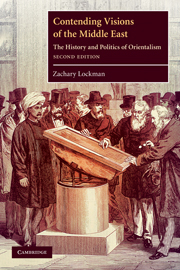Book contents
- Frontmatter
- Contents
- List of maps
- Acknowledgments
- Preface to the second edition
- Maps
- Introduction
- 1 In the beginning
- 2 Islam, the West and the rest
- 3 Orientalism and empire
- 4 The American century
- 5 Turmoil in the field
- 6 Said's Orientalism: a book and its aftermath
- 7 After Orientalism?
- Afterword
- Notes
- Bibliography
- Index
6 - Said's Orientalism: a book and its aftermath
Published online by Cambridge University Press: 05 June 2012
- Frontmatter
- Contents
- List of maps
- Acknowledgments
- Preface to the second edition
- Maps
- Introduction
- 1 In the beginning
- 2 Islam, the West and the rest
- 3 Orientalism and empire
- 4 The American century
- 5 Turmoil in the field
- 6 Said's Orientalism: a book and its aftermath
- 7 After Orientalism?
- Afterword
- Notes
- Bibliography
- Index
Summary
Edward W. Said (pronounced “Sah-eed”) was born in Jerusalem, then the capital of British-ruled Palestine, in 1935, but spent most of his childhood in Cairo, where his father ran a successful stationery and office supplies business. Said's family returned to live in Jerusalem in 1947 but, like hundreds of thousands of other Palestinians, was soon compelled to leave by the outbreak of Arab–Jewish fighting that followed the United Nations' decision to partition the country into separate Arab and Jewish states. Said went back to school in Cairo and then on to secondary school and college in the United States, graduating from Princeton University in 1957. He pursued graduate studies in English literature at Harvard University, receiving his doctorate in 1964. He had begun teaching at Columbia University the previous year, and over the decades that followed he would ascend through the academic ranks at Columbia to become University Professor of English and Comparative Literature. In September 2003, Edward W. Said finally succumbed to leukemia, the disease he had been battling for over a decade.
Said's first book, on the Polish-born writer Joseph Conrad, was followed in 1975 by Beginnings, a literary study that also manifested Said's growing political engagement. For Said as for many Palestinians and other Arabs, the Arab defeat in 1967 and Israel's conquest of the remainder of Palestine had come as a profound shock. Said gradually moved toward a much stronger embrace of his identity as a Palestinian as well as toward political activism.
- Type
- Chapter
- Information
- Contending Visions of the Middle EastThe History and Politics of Orientalism, pp. 183 - 215Publisher: Cambridge University PressPrint publication year: 2009

